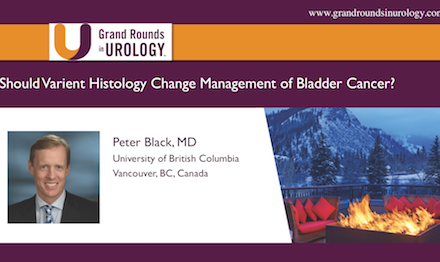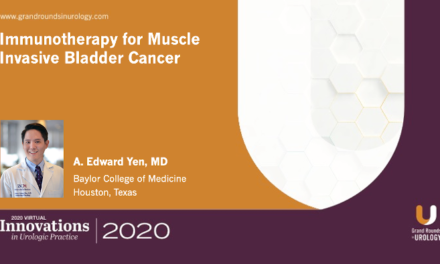Case-Based Panel Discussion: Muscle-Invasive Bladder Cancer
A. Edward Yen, MD; Jennifer M. Taylor, MD, MPH; Guilherme Godoy, MD, MPH; and Seth P. Lerner, MD, presented “Case-Based Panel Discussion: Muscle-Invasive Bladder Cancer” during the 24th Annual Innovations in Urologic Practice on September 14, 2019 in Santa Fe, New Mexico.
How to cite: Yen, A. Edward, Lerner, Seth P., Godoy, Guilherme, and Taylor, Jennifer M. “Case-Based Panel Discussion: Muscle-Invasive Bladder Cancer” September 14, 2019. Accessed Jan 2025. https://dev.grandroundsinurology.com/case-based-panel-discussion-muscle-invasive-bladder-cancer/
Case-Based Panel Discussion: Muscle-Invasive Bladder Cancer – Summary:
A. Edward Yen, MD; Jennifer M. Taylor, MD, MPH; Guilherme Godoy, MD, MPH; and Seth P. Lerner, MD, examine four unique case examples to elaborate on various treatment approaches for muscle-invasive bladder cancer (MIBC) based on individual patient needs. The panel discussion reviews current data on neoadjuvant chemotherapy, trimodal therapy, and checkpoint inhibitors in this setting.
The 24th Annual Innovations in Urologic Practice also included a Case-Bases Panel Discussion on Non-Muscle Invasive Bladder Cancer.
Abstract:
In the first two cases presented in this panel discussion, Dr. Taylor describes patients who are guideline-recommended candidates for receiving neoadjuvant chemotherapy (NAC) with cisplatin, along with cystectomy. Dr. Lerner discusses the importance of re-resection following initial transurethral resection of a bladder tumor (TURBT) before discussing treatment options, then presents the data supporting the use of NAC for patients across all risk classes.
The second case introduces the topic of alternatives to cisplatin and cystectomy for those patients who, due to either preference or ineligibility, require different treatment options. Dr. Yen discusses factors disqualifying some patients from receiving cisplatin or NAC altogether, as well as the inferiority of alternatives such as carboplatin, while Dr. Lerner demonstrates why cystectomy alone is recommended if patients are unable to undergo NAC with cisplatin. Dr. Godoy details trimodal therapy (TMT) as an alternative to NAC and cystectomy (as well as which patients qualify), and the factors of outcomes and cost still hindering the recommendation of TMT for patients who are eligible for cystectomy.
The fourth case involves treatment options for advanced urothelial carcinoma. Dr. Yen discusses checkpoint inhibitor therapies (CPI) on all patients, specifically in patients who are ineligible for cisplatin or platinum therapies. He also describes how checkpoint inhibitors provide durable and tolerable responses in advanced disease. He also discusses adverse effects of CPI and future directions for this therapy option, including possible frontline combinations and CPI’s potential role in maintenance following platinum-based treatment.
About the 24th Annual Innovations in Urologic Practice
Innovations in Urologic Practice (Innovations) is an annual, multi-day, CME-accredited conference devoted to innovative diagnostic and treatment strategies for and controversies related to some of the most common urologic problems in the current era. The topics covered include oncological management of the bladder, kidney, and prostate. The conference also emphasizes general urology topics in pelvic reconstruction and trauma, men’s health, and infections in the urology patient. Drs. Yen, Lerner, Godoy, and Taylor presented this lecture during the 24th Innovations in 2019. Please visit this page in order to register for future Innovations meetings.
ABOUT THE AUTHOR
Dr. Taylor is an Assistant Professor of Urology at Baylor College of Medicine in Houston, Texas. She serves as the Associate Residency Program Director and Director of Preclinical and Clinical Urology Courses for medical students. She is a member of the Dan L. Duncan Comprehensive Cancer Center at Baylor and the Cancer Committee at the Michael E. DeBakey VA Medical Center. She currently practices urologic oncology at Baylor College of Medicine and the Michael E. DeBakey VA Medical Center. Dr. Taylor received her undergraduate education from Barnard College in New York City. She went on to earn her MD from the University of Texas Medical School in Houston, and completed a fellowship in urologic oncology at Memorial Sloan Kettering Cancer Center in New York City. She also earned an MPH from the Harvard TH Chan School of Public Health in Boston. Dr. Taylor is involved in clinical research in multiple GU malignancies, with a focus on bladder cancer, as well as research in medical education. Dr. Taylor is involved in the national medical community and is a member of the American Urological Association, the Society of Urologic Oncology, the Society of Women in Urology, and the American College of Surgeons.




